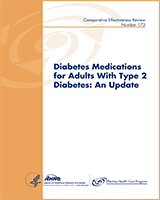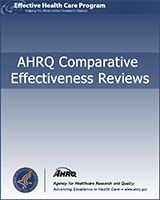NCBI Bookshelf. A service of the National Library of Medicine, National Institutes of Health.
Excerpt
We have performed a systematic review of published studies on the comparative effectiveness and safety of all oral diabetes medications. By comparing the short-term and long-term clinical effects of these medications, clinicians may have a better sense of how to choose among the oral diabetes medications. This review should be helpful as new classes of oral diabetes medications come on the market, such as the dipeptidyl peptidase-IV (DPP-IV) inhibitors. In addition, the results presented here may provide policymakers and insurers with better insight as they consider policies relating to medication coverage.
Contents
- Preface
- Acknowledgments
- Executive Summary
- 1. Introduction
- 2. Methods
- 3. Results
- Results of Search and Quality of Systematic Reviews
- Results of Primary Literature Review
- Key Question 1: Do oral diabetes medications for the treatment of adults with type 2 diabetes differ in their ability to affect the following proximal clinical outcomes: glycated hemoglobin, weight, blood pressure, serum lipid levels, and 2 hour PPG levels?
- Key Question 2: Do oral diabetes medications for the treatment of adults with type-2 diabetes differ in their ability to affect distal diabetes-related complications including mortality and the following macrovascular and microvascular complications: coronary artery disease, myocardial infarction, stroke, transient ischemic attack, arrhythmia, coronary artery stenosis and in-stent re-stenosis, retinopathy, nephropathy, neuropathy, and peripheral arterial disease?
- Key Question 3: Do oral diabetes medications for the treatment of adults with type 2 diabetes differ in their ability to influence other health outcomes including quality of life and functional status?
- Key Questions 4 and 5: Do oral diabetes medications for the treatment of adults with type 2 diabetes differ in terms of risk of the following life-threatening adverse events: life-threatening hypoglycemia leading to emergency care or death; liver failure; CHF; severe lactic acidosis; cancer; anemia, thrombocytopenia, or leucopenia requiring transfusion; and allergic reactions leading to hospitalization or death?
- Do oral diabetes medications for the treatment of adults with type 2 diabetes differ in their safety for the following adverse events that are not life-threatening: hypoglycemia requiring any assistance; elevated aminotransferase levels; pedal edema; hypervolemia; anemia, thrombocytopenia, and leucopenia not requiring transfusion; mild lactic acidosis; and GI problems?
- Key Question 6: Do safety and effectiveness of oral diabetes medications for the treatment of adults with type 2 diabetes differ across particular adult populations such as those based on demographic factors (e.g., race/ethnicity, age greater than 65 years, or gender) or comorbid conditions (e.g., renal insufficiency, CHF, liver disease, obesity, depression, or schizophrenia)?
- 4. Conclusions
- List of Acronyms/Abbreviations
- Appendixes
- Appendix A. Technical Experts and Peer Reviewers
- Appendix B. Hand Searched Journals
- Appendix C. Detailed Electronic Database Search Strategies for Systematic Reviews
- Appendix D. Excluded Articles
- Appendix E. Sample Forms
- Appendix F. Evidence Tables
- Appendix G. Placebo-Controlled Meta-Analyses
- Appendix H. List of Studies Included in Meta-Analyses
- References
Suggested citation:
Bolen S, Wilson L, Vassy J, Feldman L, Yeh J, Marinopoulos S, Wilson R, Cheng D, Wiley C, Selvin E, Malaka D, Akpala C, Brancati F, Bass E. Comparative Effectiveness and Safety of Oral Diabetes Medications for Adults With Type 2 Diabetes. Comparative Effectiveness Review No. 8. (Prepared by Johns Hopkins Evidence-based Practice Center under Contract No. 290-02-0018.) Rockville, MD: Agency for Healthcare Research and Quality. July 2007. Available at: http://effectivehealthcare.ahrq.gov/healthInfo.cfm?infotype=all&reptype=allfinal.
This report is based on research conducted by The Johns Hopkins University Evidence-based Practice Center (EPC) under contract to the Agency for Healthcare Research and Quality (AHRQ), Rockville, MD (Contract No. 290-02-0018). The findings and conclusions in this document are those of the author(s), who are responsible for its contents; the findings and conclusions do not necessarily represent the views of AHRQ. Therefore, no statement in this report should be construed as an official position of the Agency for Healthcare Research and Quality or of the U.S. Department of Health and Human Services.
This report is intended as a reference and not as a substitute for clinical judgment. Anyone who makes decisions concerning the provision of clinical care should consider this report in the same way as any medical reference and in conjunction with all other pertinent information.
This report may be used, in whole or in part, as the basis for development of clinical practice guidelines and other quality enhancement tools, or as a basis for reimbursement and coverage policies. AHRQ or U.S. Department of Health and Human Services endorsement of such derivative products may not be stated or implied.
None of the investigators has any affiliations or financial involvement that conflicts with the material presented in this report.
- 1
540 Gaither Road, Rockville, MD 20850. www
.ahrq.gov
- Comparative Effectiveness and Safety of Oral Diabetes Medications for Adults Wit...Comparative Effectiveness and Safety of Oral Diabetes Medications for Adults With Type 2 Diabetes
Your browsing activity is empty.
Activity recording is turned off.
See more...

